 When Saracens became the first Premiership side to win the European Cup for eight years in Lyon a fortnight ago, they put the seal on a triumphant return to the highest rank for English club rugby. An uplift in English fortunes was long overdue, and while the final was a physical war of attrition in which Saracens convincingly outmanoeuvred and outpointed Racing to become champions of Europe for the first time, their success was richly deserved.
When Saracens became the first Premiership side to win the European Cup for eight years in Lyon a fortnight ago, they put the seal on a triumphant return to the highest rank for English club rugby. An uplift in English fortunes was long overdue, and while the final was a physical war of attrition in which Saracens convincingly outmanoeuvred and outpointed Racing to become champions of Europe for the first time, their success was richly deserved.
Saracens' European dominance was reflected not only in their record of becoming the first champions to win all nine of their matches – sparkling home and away pool victories over Toulouse and Ulster among them – but also in their ability to do it while making a resounding impact on two other fronts. These include Saracens mounting a punishing defence of their domestic title, while also providing a substantial contingent to the 2016 Grand Slam team.
That excellence is reflected in my team of the English club season, which encompasses the European Cup as well as the Premiership. It sees six Saracens forwards selected in the starting XV, and there are no apologies for picking their entire front five along with Billy Vunipola.
The No.8 may have played a little over half of Saracens games, but his contribution, like that of the front five, was never less than mighty. Big Billy not only battered Racing, and their talisman, Chris Masoe, to a standstill, a week later he produced the slickest of backhand passes after a blindside pick-and-drive to create Chris Ashton's first try in the Premiership semi-final against Leicester.
That left just two places in the pack, with the flanker shirts being claimed by Teimana Harrison, who has played with an almost feral hunger for Northampton, and George Smith, who galvanised Wasps with his knowledge, skill, and competitive steel.
The only reservation is that none of Exeter's formidable pack made the cut, although Don Armand was within a whisker, and Mitch Lees, Alec Hepburn and Harry Williams would also have been in closer contention if they had played more.
In the backs Dan Robson had a tremendous debut season for Wasps, and was unlucky to miss out on selection for Australia, while three more Saracens – Owen Farrell, Alex Goode and the indomitable Brad Barritt – were consistently outstanding.
When it came to glittering moments of individual brilliance, the campaign was lit up by the jack-knife running of Exeter's Jack Nowell, as well as the swashbuckling forays of Elliot Daly and Charles Piutau in Wasps ‘pool of death' wins over Toulon, Leinster and Bath. It was a memorable season, the quality of which is reflected in this team.
1. Mako Vunipola – (Saracens – played 21 out of 31 Premiership and European matches, either starting or off the bench)
One of the best ball-carrying props in Europe, which has given Saracens extra punch around the pitch over the last few seasons. Has the dexterity to make soft passes out of heavy contact to put others through gaps. He has also improved as a scrummager – and, as he proved in the European Cup final, is no longer unsettled easily.
2. Schalk Brits – (Saracens – played 22 out of 31)
An outstanding all-round forward. The South African-born hooker may not be quite the explosively fast counter-attacking runner he was when he first came into the Premiership, but he is still very dynamic on the ball and links and tackles like a Test openside. Strikes cleanly at the scrum and his throwing is an important cog in the best line-out in the country.
3. Petrus du Plessis – (Saracens – played 30 out of 31)
The unsung hero in the Saracens pack. Brad Barritt may talk about ‘pounding the rock', but Du Plessis has been a rock that no opponents have managed to break. Has shown remarkable durability end consistency in such a punishing position – while his defence around the fringes has been unyielding.
 4. Maro Itoje – (Saracens – played 22 out of 31)
4. Maro Itoje – (Saracens – played 22 out of 31)
The player of the season. Being on the winning side in every match bar one over an entire season at elite level is a landmark on its own. Doing it while also being a highly influential part of European Cup and then England Grand Slam teams at 21 is extraordinary. Itoje has been exceptional not just for his spring-heeled athleticism but for his almost clairvoyant anticipation.
5. George Kruis – (Saracens – played 20 out of 31)
Has laid claim to being the best line-out general in Europe. Great locks travel in pairs, and Kruis has dovetailed brilliantly with Itoje over the course of this campaign for club as well as country. Has developed the same facility as greats like Victor Matfield of making soaring line-out deflections look like child's play, while his work-rate is off the chart.
6. Teimana Harrison – (Northampton – 27 out of 29)
Has that manic power which enables him to make headway in tight corners. Punches above his weight and size as a carrier and tackler, which is how Northampton got away with using him at No.8 for most of the season. Eddie Jones has got him pegged as an openside flanker, and he could be a very good one, but, in this instance, his marauding skills will not go begging at blindside.
7. George Smith – (Wasps – played in 26 of 30)
The Aussie's salad days may be well behind him, but the old dog got fit enough to play with match-turning vim at the breakdown and in the tackle. He also showed that he had learned new tricks as a playmaker, and his range of skills, whether passing or sliding through grubber-kicks, saw him finish his debut Premiership season as one of its most influential players.
8. Billy Vunipola – (Saracens – played in 17 of 31)
A coming-of-age for big Billy. Seemed to get over his growing pains the instant that he got the Jones seal of approval, going on the rampage for Saracens and England, both in attack and defence. His handling at the base of the scrum improved, and his pick-ups from quick heels caused opposing defences no end of bother. Like his brother, has great hands.
9. Dan Robson – (Wasps – played in 28 out of 30)
Developing that air of command that is a hallmark of the best 9s. Neat movement and crisp passing from the base, but also fast-breaking and elusive enough to punish any defence not on red alert. Scored eight tries during the season – some short range, some long – has a box-kick capable of turning the tables, and is a tireless cover tackler. One to watch.
10. Owen Farrell – (Saracens – played in 20 out of 31)
He is a world class goal-kicker, and bar the odd rush of blood in defence, the rest of his game is not far behind. Has always been a good passer but made big strides in attack. Seems a couple of yards faster, and playing flatter to the gain line, probing for gaps, and tearing through if the chance is there. Strong in the tackle, has good radar as a tactical kicker.
11. Jack Nowell – (Exeter – played in 16 out of 29)
Started the season as promising, and finished it as one of the most potent attackers in the Northern Hemisphere. The Exeter wing brings such energy and dynamism whenever he is in the vicinity of the ball, that he is hard to hold. Uses slick footwork and rapid acceleration to bamboozle defenders, and is a picture of tenacity in the tackle.
12. Brad Barritt – (Saracens – played in 24 out of 31)
They say you can't keep a good man down, and Barritt rebounded from the disappointment of being discarded by England after the World Cup by leading the Saracens charge on the European and domestic fronts. The term ‘fearless tackler' is a well-worn rugby cliche, but the unflinching courage which Barritt shows consistently is the real thing.
 13. Elliot Daly – (Wasps – played in 25 out of 30)
13. Elliot Daly – (Wasps – played in 25 out of 30)
The sight of Daly flicking the switch to go to warp-speed on an outside break lit up the season – with the spectacular 45m try he scored in the European Cup against Leinster a case in point. He was a constant threat, although Wasps did not always manage to get the ball to him quickly enough. He was also robust in defence. Should be more to come in Australia.
14. Charles Piutau – (Wasps – played in 23 out of 30)
His epic last-gasp charge against Exeter to clinch the European Cup quarter-final was one of the tries of this, or any, season. There were times when Piutau was almost unplayable, such was his power, speed, cat-like reflexes and determination. It was a pity that the sheer physical attrition of the campaign seemed to have taken the edge off his sharpness in both semi-finals.
15. Alex Goode – (Saracens – played in 24 out of 31)
Always a handy playmaker, the Saracens full-back found extra gears that turned him into a constant counter-attacking threat. Hard pre-season work paid off in a metre of added pace, and combined with his already mazy changes of direction, he generated indecision in opposition line – with Chris Wyles and Chris Ashton regular beneficiaries.
Replacements:
16. Mike Haywood – (Northampton)
All-action Saints hooker who took his chance during Dylan Hartley's absence.
17. Alec Hepburn – (Exeter)
Aggressive and effective – deserved his call-up for the Saxons in South Africa.
18. Jake Cooper-Woolley – (Wasps)
Tank of a tighthead who showed he's a force at the scrum and around the pitch.
19. Mitch Lees – (Exeter)
Tractor lock who made a big impact before leg injury, and repeated it on his return.
20. Don Armand – (Exeter)
Fast and furious. The big backrower bumps try-king Thomas Waldrom off the bench.
21. Richard Wigglesworth – (Saracens)
Peerless No.9 kicking and linking game, but a prompter more than a runner.
22. Gareth Steenson – (Exeter)
Smart controller whose gift was putting the Chiefs in the right place at the right time.
23. Chris Wyles – (Saracens)
Not the most flamboyant wing, but one of the most effective – in attack and defence.


























